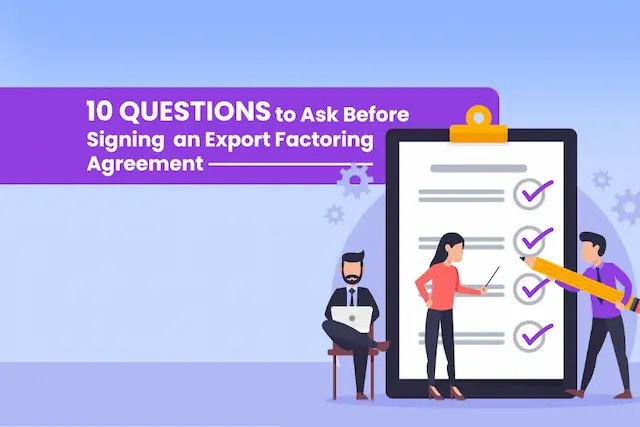In the dynamic landscape of international trade, businesses are constantly seeking innovative financial solutions to fuel their global expansion. Export invoice factoring emerges as a powerful tool, providing companies with the liquidity and flexibility needed to navigate the complexities of cross-border commerce.
This comprehensive exploration delves into the intricacies of export invoice factoring, its mechanics, benefits, practical applications, and the evolving landscape of global trade finance.
Understanding Export Invoice Factoring
Export invoice factoring involves a financial institution, commonly known as a factor, purchasing a company’s outstanding invoices at a discount. While similar to domestic factoring, export invoice factoring is tailored for businesses engaged in cross-border transactions. The exporter gains immediate access to cash flow by selling its accounts receivable to the factor.
The Mechanics of Export Invoice Factoring
Here’s how it works:
Initiation: The exporter initiates the process by submitting invoices to the factoring company.
Due Diligence: The factor conducts due diligence, assessing the creditworthiness of the importer and the risk associated with the transaction.
Advance Payment: Upon approval, the factor advances a significant percentage (typically 80-90%) of the invoice value to the exporter.
Payment Collection: The factor assumes responsibility for collecting payments from the importer.
Final Settlement: The remaining balance, minus the factor’s fee, is remitted to the exporter upon full payment from the buyer.
Benefits of Export Invoice Factoring

Understand some benefits of export invoice factoring:
Immediate Cash Flow: Export invoice factoring provides exporters with quick access to cash, helping them meet immediate working capital requirements.
Risk Mitigation: Factors assume the credit and payment risks associated with international transactions, protecting exporters from potential losses due to non-payment or other uncertainties.
Enhanced Liquidity: By converting accounts receivable into immediate cash, export invoice factoring improves liquidity, allowing exporters to fund ongoing operations and investments.
Flexible Financing: Export invoice factoring offers flexible financing options, accommodating the varying needs and fluctuations in the volume of international trade.
Credit Management: Factors often provide credit management services, helping exporters assess the creditworthiness of international customers and making informed decisions on trade credit.
Reduced Administrative Burden: Outsourcing the receivables management process to a factor reduces the administrative burden on exporters, allowing them to focus on core business activities.
Global Market Expansion: With improved cash flow and risk mitigation, export invoice factoring becomes a catalyst for global market expansion, enabling businesses to explore and seize opportunities in new international markets.
Competitive Advantage: Exporters utilizing invoice factoring can offer more favorable credit terms to international buyers, gaining a competitive advantage in the global marketplace.
Improved Working Capital Management: Factoring helps exporters better manage their working capital by providing a steady and predictable cash flow, allowing for better planning and financial stability.
Access to Expertise: Factoring companies often have expertise in international trade finance, providing exporters with valuable insights, guidance, and support in navigating the complexities of cross-border transactions.
Practical Applications in Global Trade
Export invoice factoring has proven to be a vital component in the global business strategies of various industries, including manufacturing, technology, and textiles. In practical applications, companies within these sectors have strategically utilized export invoice factoring to achieve enhanced liquidity and facilitate international growth.
In the manufacturing industry, where large-scale production and distribution are common, export invoice factoring plays a crucial role. Manufacturers often face challenges related to cash flow, especially when dealing with international clients who may have extended payment terms. By leveraging export invoice factoring, manufacturing companies gain immediate access to funds tied up in accounts receivable, allowing them to meet operational needs promptly and seize opportunities for expansion.
Technology companies engaged in international trade also find export invoice factoring advantageous. The rapid pace of technological advancements and the competitive nature of the industry require companies to stay agile. Export invoice factoring enables technology firms to navigate global transactions with confidence, as factors assume credit and payment risks, providing a financial safety net for businesses engaging in cross-border deals.
Similarly, the textiles industry, which often operates on tight margins and faces fluctuating demand, benefits from export invoice factoring. By converting unpaid invoices into immediate cash, textile companies can address working capital challenges and maintain a steady production cycle, ensuring they can capitalize on international market opportunities.
These real-world examples underscore how export invoice factoring serves as a strategic financial tool, fostering liquidity and driving international growth across diverse industries in the global marketplace.
Factors Influencing the Cost of Export Factoring
The cost of export invoice factoring is influenced by several key factors that businesses must consider. One significant determinant is the creditworthiness of buyers, as the risk assumed by the factor correlates with the financial stability of the purchasing entities. Transaction volume is another critical element, with larger volumes often resulting in more favorable terms.
Additionally, the specific terms outlined in the factoring agreement, such as the discount rate and any additional fees, play a pivotal role in determining overall expenses. To optimize cost-effectiveness, businesses engaging in export factoring should engage in strategic negotiation with factors and carefully scrutinize the terms of the agreement. By understanding these influential factors and actively managing the negotiation process, companies can ensure that export invoice factoring remains a financially viable and beneficial solution for their international trade activities.
Comparing Export Factoring with Other Financing Options
In comparing export invoice factoring with alternative financing options such as traditional bank loans and other trade finance instruments, several key factors underscore the unique advantages that factoring brings to businesses involved in global trade.
Flexibility: Export invoice factoring offers unparalleled flexibility compared to traditional bank loans. While bank loans typically come with rigid terms and conditions, factoring arrangements are more adaptable. Factors tailor their services to accommodate the specific needs and circumstances of the exporting business. This flexibility is particularly beneficial in the dynamic landscape of international trade, where conditions can change rapidly.
Speed of Funding: One of the standout features of export invoice factoring is the expeditious access to working capital. Unlike the often lengthy approval processes associated with bank loans, factoring provides quick liquidity by converting outstanding invoices into immediate cash. This swift access to funds is crucial for businesses engaged in global trade, allowing them to seize time-sensitive opportunities and navigate cash flow challenges promptly.
Risk Mitigation: Export factoring stands out in its ability to mitigate risks associated with international transactions. Factors assume the credit and payment risks, shielding exporters from uncertainties related to buyer defaults, currency fluctuations, and political instability. Traditional bank loans may not offer the same level of risk protection, making factoring an attractive option for businesses looking to minimize exposure in their global trade activities.
Collateral Requirements: While traditional bank loans often require substantial collateral, export invoice factoring relies primarily on the creditworthiness of the buyer. This can be advantageous for businesses that may have limited tangible assets to pledge as collateral but have reputable international clients.
Administrative Efficiency: Export factoring simplifies administrative processes for businesses. Factors typically handle the collections and credit management aspects, reducing the administrative burden on exporters. In contrast, managing the complexities of international transactions and compliance requirements associated with traditional bank loans can be more cumbersome.
Addressing Common Concerns and Misconceptions
Understand and unlearn some of the common myths and concerns related to export invoice factoring in global growth:
Loss of Control Myth: Contrary to the misconception that export invoice factoring means relinquishing control, businesses retain operational autonomy. Factors focus on receivables management, allowing companies to concentrate on core activities while enjoying improved cash flow.
Client Relationships: Concerns about strained client relationships are unfounded. Factoring is often seamless and transparent to clients, with factors acting professionally in their collections. This ensures that business relationships are maintained and even strengthened through timely payments.
Potential Complications: While there may be concerns about added complications, export invoice factoring is designed to simplify the financial aspect of international trade. Factors handle credit risks and payment collections, reducing the complexity for businesses and offering a streamlined approach to managing cash flow.
Cost Perception: Some businesses may worry about the cost of factoring. However, when considering the benefits, such as risk mitigation and improved liquidity, the overall value often outweighs the perceived costs. Strategic negotiation with factors can also optimize cost-effectiveness.
Limited Financing Options: It’s a misconception that factoring is a last resort. In reality, it is a proactive financing tool. It provides quick access to working capital, especially beneficial for businesses engaged in global trade where timing is crucial.
Size Limitations: Export invoice factoring is not reserved for large enterprises. Small and medium-sized businesses can benefit significantly, gaining access to immediate funds that aid in operational needs and expansion opportunities.
Creditworthiness Concerns: Businesses may worry about the impact on their creditworthiness. However, factoring is more closely tied to the buyer’s creditworthiness, making it accessible to businesses with varying credit profiles.
Long-Term Commitment Apprehension: Businesses may fear being locked into long-term commitments. However, factoring arrangements can be flexible, with companies able to choose which invoices to factor and for how long, allowing for strategic and adaptable financial management.
Also Read: What is the Difference Between Trade Finance and Invoice Factoring?
The Future Landscape of Export Invoice Factoring
As global trade continues to evolve, the future of export invoice factoring is shaped by emerging trends and technological advancements. The integration of digital platforms, blockchain technology, and innovative financial instruments heralds a transformative era in international trade finance.
Conclusion
In conclusion, export invoice factoring stands as a dynamic and indispensable tool for businesses aspiring to unlock global growth. Its ability to provide immediate liquidity, mitigate risks, and foster international expansion positions it as a cornerstone in the financial strategies of forward-thinking companies. As the global business environment continues to evolve, export invoice factoring remains a key driver of success for those seeking to navigate the complexities of international trade with agility and resilience.
Also Read: A Guide to Finding the Best Invoice Factoring Platform





